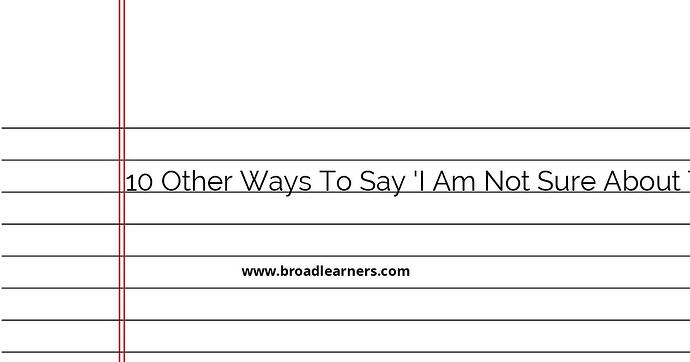When you are unsure about something, it is important to express your uncertainty in a clear and polite manner. Saying 'I am not sure about this' may sound straightforward, but there are alternative ways to convey the same message.
Here are 10 other ways to express your uncertainty:
- I'm not entirely certain
- I'm not completely sure
- I'm not confident about this
- I'm unsure about this
- I have some doubts about this
- I'm not convinced about this
- I'm not entirely convinced
- This is unclear to me
- I'm not confident in my understanding of this
- I'm not entirely clear about this
Let's explore some examples for each alternative sentence:
1. I'm not entirely certain
This phrase indicates that you have some uncertainty, but there might be a possibility of being more sure in the future. It is a polite way to express your doubts.
Example: 'I'm not entirely certain about the outcome of the project, but I will gather more information before making a decision.'
2. I'm not completely sure
This phrase implies that there is a level of uncertainty, but you still have some knowledge or understanding about the subject. It shows a cautious approach.
Example: 'I'm not completely sure if I can attend the meeting tomorrow, as I may have a conflicting appointment.'
3. I'm not confident about this
This expression conveys a lack of confidence or trust in your understanding or opinion. It suggests that you need more information or clarification.
Example: 'I'm not confident about this marketing strategy, as I think it may not resonate with our target audience.'
4. I'm unsure about this
This statement indicates a lack of certainty or confidence in your knowledge or judgment. It suggests that you need additional clarification or guidance.
Example: 'I'm unsure about the instructions for this task. Could you please provide more details?'
5. I have some doubts about this
This phrase acknowledges the presence of doubts or concerns regarding a particular matter. It conveys a need for further clarification or discussion.
Example: 'I have some doubts about the feasibility of this project. We should analyze the risks and potential challenges.'
6. I'm not convinced about this
This expression suggests that you are not fully persuaded or convinced about a particular idea or concept. It implies a need for more convincing evidence or information.
Example: 'I'm not convinced about the effectiveness of this new software. We should conduct a thorough evaluation before making a decision.'
7. I'm not entirely convinced
This phrase indicates that you have some reservations or doubts regarding a particular matter. It suggests a need for further discussion or evidence to change your perspective.
Example: 'I'm not entirely convinced that this is the best approach. Let's explore alternative options and compare the potential outcomes.'
8. This is unclear to me
This statement suggests that you find the subject or matter difficult to understand or comprehend. It implies a need for clarification or further explanation.
Example: 'The instructions provided are unclear to me. Can you please elaborate on the steps involved?'
9. I'm not confident in my understanding of this
This expression implies that you lack confidence in your own comprehension or interpretation of a particular matter. It suggests a need for clarification or additional guidance.
Example: 'I'm not confident in my understanding of the project requirements. Could you please review and confirm my understanding?'
10. I'm not entirely clear about this
This phrase suggests that you have some confusion or lack of clarity regarding a particular matter. It conveys a need for further explanation or information.
Example: 'I'm not entirely clear about the timeline for this project. Can you provide some more details?'
By using these alternative phrases, you can effectively communicate your uncertainty or lack of confidence in a polite and professional manner.
Did I miss anything? Respond below
